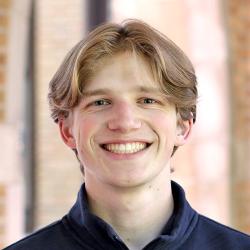
Lucas Fahnoe
Graduation year: 2024
High school: Rolling Meadows High School
Hometown: Arlington Heights, Ill.
Majors: Philosophy, neuroscience
Minor: Japanese
Activities: Socratic Society of Augustana, 8x8 Chess Club, Go & Chill Out
Post-grad plans: I'll teach English in Japan for a year, then pursue graduate studies in philosophy.
Why Augustana?
When I first visited, I remember feeling a sense of comfort on campus, but the reason I stayed was the variety and rigor of my education. I've sought out a host of unique opportunities here, from running my own studies to playing chess weekly with a professor, and have been pushed academically in just as many ways.
Are you where you thought you'd be when you first came to campus?
Not at all, but I can't say I thought much about it back then. Besides Japanese, I didn't know what I wanted to study in college. Following my first J-term, though, when I took Dr. Gould's wonderful Kinds of Minds course, I was dead set on philosophy (and a lifelong interest in cephalopods).
Later on, I took up neuroscience as a way to flesh out my newly realized passions, particularly in the philosophy of mind. Surprisingly (at least to an unfamiliar eye), these fields collide in the most meaningful of ways, which I plan on pursuing in graduate school.
Who helped you get to where you are now?
I want to first thank my parents for their continuous love and support. None of what I've accomplished today would've been remotely possible without them. My sisters, too, for always making me smile when I'd go home.
Second, I have my friends to thank for our late-game nights and long conversations (whether in English or Japanese). To this I owe my roommates and the Socratic Society, particularly the after-hours crew, a special shoutout.
And third, I'm honored to thank my many professors at Augustana, including Dr. Gould, Dr. Bonzon, Komura-sensei, Dr. Storl, Dr. Harrington and Dr. Kopatich.
If it weren't for them, I may never have understand the beauty of logic (and octopuses); the lore of the Pre-Socratics (and the Colle System); the joy of foreign language instruction (本当にそう!); the weight of philosophical writing; the power of intellectual flexibility; and the grind of both academia and research.
Peak experience?
If I had to pick just one, it'd be solving proofs with sidewalk chalk in Dr. Gould's Formal Logic class; or, put more formally: "Es • (x)[(Ex • ~x=s) → Nsx]."
There was just something so special about, on a beautiful spring afternoon, underneath a deep blue sky, scribbling out MPs and RAAs with egg-shaped chalk on the walkways surrounding Old Main. We were spreading the good word of logic, and spread it well.
What surprised you?
How little it hurts to ask. The immediate willingness of Augustanian professors to not just passively respond to but actively answer each and every one of my questions was, to say the least, surprising. I've opened so many doors through being unafraid to ask, and I encourage you all to try doing the same.
How did you use your Augie Choice?
To participate in the "Neurophilosophy in Germany" study abroad program, led by Dr. Storl and Dr. Harrington.
What will you miss the most?
I'll forever appreciate the passion of the philosophy department, cherish the dialogues I shared with peers and professors, and value the time I spent exploring and enjoying both Augustana's campus (including night walks, jazz concerts, and volleyball games) and the Quad Cities. In other words, there isn't one thing I'll miss the most, though I will remember all of it ever so fondly.
Advice for the Class of 2028?
Open yourself to the world, and it'll open itself to you. Do so earnestly. You'll be amazed at what this life, the phenomenological life, is like; it's as if you're a sponge, soaking up all of what this wild yet wondrous world has to offer.
Also, read Plato's "Apology."
"For several years Lucas and I have played a serious over-the-board chess game every week. In our first game, right before the end of his sophomore year, he lost to me. When we resumed playing during his junior and senior years, I have almost always lost to him. Lucas studied the game, learned openings and developed his style. That perfectly describes him as a student as well: he explores, he studies, he thinks. He learns to become his better self."
